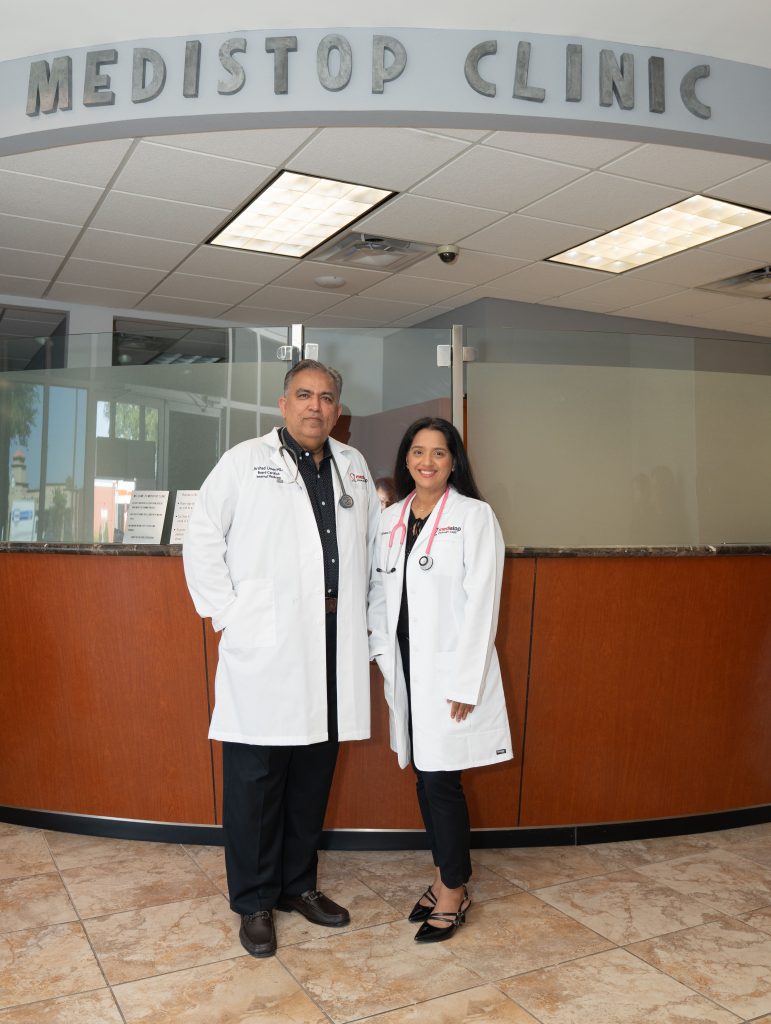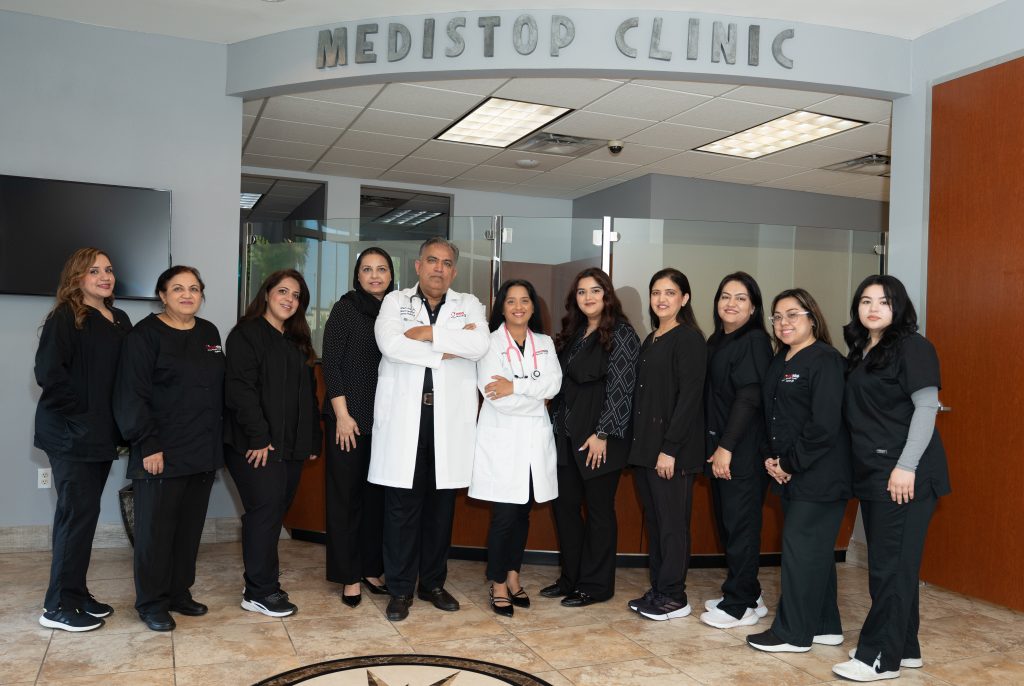
Many people delay doctor visits until something feels seriously wrong. But waiting too long often turns small issues into serious health problems. The truth is, your body sends clear signals when it needs medical attention—and ignoring them is a risk you shouldn’t take.
That’s where a primary care physician plays a crucial role. These doctors aren’t just for colds and checkups. They’re the front line of your long-term health. At Medistop, our primary care physicians in Sugar Land, Katy, Rosenberg, and Dickinson help patients recognize these early warning signs and respond with timely, effective care.
Below are 7 critical signs it’s time to book an appointment with a primary care doctor—before things get worse.
1. You Haven’t Had a Physical in Over a Year
One of the most overlooked signs that it’s time to see a doctor is actually no sign at all—just the simple fact that it’s been too long. If you haven’t had an annual physical exam in the past 12 months, it’s time to schedule one now.
Many health conditions develop quietly, with no obvious symptoms. High blood pressure, diabetes, thyroid disorders, and cholesterol imbalances can all be present without any noticeable signs—until it’s too late.
A yearly checkup with your primary care physician ensures:
- Blood pressure is under control
- Lab work detects hidden issues
- Lifestyle habits are reviewed
- Age-appropriate screenings are scheduled
At Medistop, our preventive care and wellness services are designed to help you stay one step ahead of illness. A missed checkup might seem harmless—but it’s often the first missed opportunity for early detection.
2. You’re Feeling Fatigued—But Don’t Know Why
Everyone gets tired. But if you’ve been feeling consistently fatigued for weeks—or you wake up tired no matter how much sleep you get—this is not something to ignore.
Fatigue is one of the body’s most common red flags. It can signal:
- Vitamin deficiencies
- Sleep apnea
- Diabetes
- Thyroid disorders
- Depression
- Heart disease
- Chronic infections
Don’t rely on guesswork or over-the-counter supplements. Your primary care doctor can order the right lab tests and guide you toward a diagnosis that gets to the root of your fatigue.
At Medistop, we don’t brush off fatigue. We listen, investigate, and help you get your energy—and your life—back.

3. You’re Managing More Than One Health Condition
If you’re juggling multiple medications, managing chronic symptoms, or coordinating between specialists, you need more than just medical attention—you need someone to oversee your entire health journey.
A primary care physician is the one provider who looks at the full picture: your labs, your prescriptions, your lifestyle, and your goals.
At Medistop, our chronic disease management program is built around coordinated care. Whether you’re living with:
- Hypertension
- Diabetes
- High cholesterol
- Asthma or COPD
- Obesity
- Arthritis
…we provide long-term support, track your progress, adjust medications, and act before complications occur. If you’re relying on urgent care or isolated specialist visits to manage complex conditions, you’re missing the full benefit of coordinated primary care.
4. You’re Always Visiting Urgent Care for Minor Issues
Urgent care clinics serve a purpose—but if you’re visiting them regularly for recurring infections, aches, or persistent symptoms, it’s time to establish a primary care relationship.
Why? Because urgent care centers often treat the symptom, not the root cause. You’ll likely see a different provider every time, with no long-term follow-up. That means recurring problems go unresolved.
At Medistop, we offer urgent and same-day care as part of a complete primary care approach. So whether you come in for a sudden cold, a minor injury, or flu-like symptoms, you’re treated by someone who knows your medical history—and who can follow up to make sure things don’t get worse.
When minor issues keep popping up, it’s your body’s way of saying, “Go see your primary care doctor.”
5. Your Medications Need Review or Refill
Taking medication without proper monitoring can be dangerous. Whether you’re on blood pressure pills, antidepressants, diabetes medications, or even long-term allergy relief, you should be seeing a doctor regularly to review:
- Dosage effectiveness
- Side effects or drug interactions
- Need for lab monitoring
- Adjustments based on lifestyle or weight changes
If you’re refilling prescriptions without seeing a provider—or relying on multiple doctors without coordination—you’re risking complications.
Your primary care physician ensures that your medication plan is safe, updated, and effective. At Medistop, we take time during every visit to review meds and explain what’s working and what’s not.
6. You’re Experiencing Digestive, Skin, or Breathing Issues That Keep Coming Back
Maybe it’s acid reflux every night, or skin rashes that won’t go away. Maybe it’s that cough that’s lasted three weeks—or stomach pain that flares up unpredictably.
When symptoms come and go—or seem mild but consistent—they’re easy to dismiss. But your primary care doctor sees them differently.
Recurring symptoms are often the first sign of:
- Gastrointestinal disorders
- Allergies or intolerances
- Eczema or autoimmune conditions
- Asthma or bronchitis
- Hormonal imbalances
- Nutritional deficiencies
At Medistop, our physicians investigate patterns over time. We don’t just treat today’s flare—we explore what’s causing the cycle and stop it before it worsens.
If you’ve Googled the same symptom more than twice in the past month, it’s time to book a visit.
7. You’ve Been Putting Off Care Because “It’s Not That Bad”
This might be the biggest red flag of all.
Many people ignore symptoms because they’re not “urgent”—but urgency doesn’t define importance. Waiting for something to become unbearable isn’t strength—it’s risk.
If you’ve been brushing off any of the following, it’s time to see your primary care doctor:
- Mild but frequent chest discomfort
- Changes in weight or appetite
- Increased anxiety or stress
- Frequent urination or thirst
- Tingling or numbness
- Irregular periods or sexual health concerns
- Trouble sleeping
At Medistop, we believe no concern is too small. We treat every appointment as an opportunity to understand and prevent future problems.

A Primary Care Physician Helps You See the Big Picture
One appointment can change the entire trajectory of your health. But even more powerful is a long-term relationship with a doctor who knows you, not just your symptoms.
Your primary care doctor doesn’t just fix what’s broken. They:
- Catch problems early
- Prevent illness before it starts
- Coordinate with specialists
- Provide guidance at every life stage
If you’re unsure whether you need a primary care physician, we encourage you to read our related blog: Why Having a Primary Care Doctor Matters More Than Ever. It breaks down exactly why now is the most important time to establish ongoing care.
Stop Waiting. Start Prioritizing.
If any of these 7 signs sound familiar, it’s time to take action. Your health is too important to leave to chance—or last-minute urgent care visits.
At Medistop, we provide comprehensive care for adults and families in Sugar Land, Katy, Rosenberg, and Dickinson. Whether you’re seeking preventive wellness services, chronic disease management, or urgent and same-day care, our team is here to support your health at every level.



